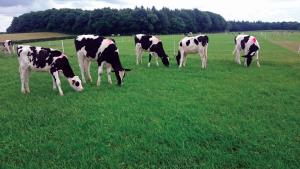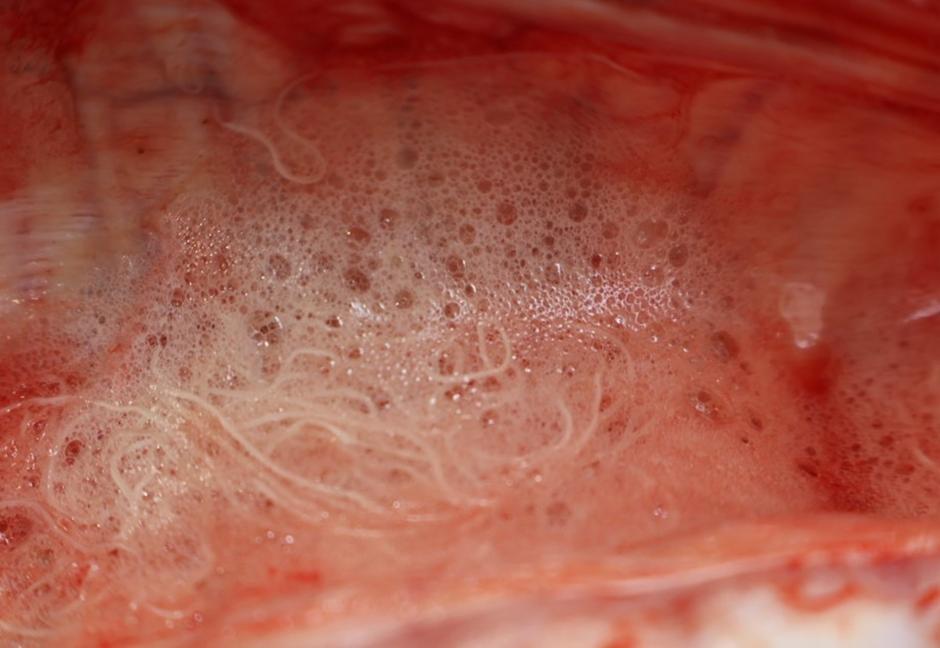Lungworm
Date published:
The lungworm, Dictyocaulus viviparus, colloquially known as Husk or Hoose, causes parasitic pneumonia in cattle.

AFBI has seen the first case of fatal lungworm this year in a carcass submitted for postmortem following reoccurring signs of pneumonia. AFBI have also identified positive cases on faecal analysis this year.
Lungworm infection occurs in cattle by the ingestion of larvae from pasture. The larvae then move to the intestines, invading across the intestinal walls, and travelling in the blood stream to the lungs, where they develop into adults. The adults then produce larvae, which are coughed up, swallowed, and passed in the faeces. Fully developed larvae survive on pasture for a relatively short time. With spring and summer 2024 showing mildly elevated average temperatures and increased average rainfall with minimal frost, the ideal environment was created for lungworm larval development.

When an animal has been exposed to lungworm, it can develop an immunity hence lungworm is generally seen in first grazing season calves in late summer or autumn. Adult cattle can become infected if they have never been exposed to lungworm, had rigorous anthelmintic control as calves or had a lack of re-exposure to maintain their protective immunity, and are then grazed on heavily contaminated pasture. Re-infection syndrome occurs in older cattle that have a partial immunity to lungworm. This syndrome can be caused by high larval numbers being ingested and migrating to the lungs at once. Larvae are rapidly killed in the lungs leading to a hypersensitivity type reaction which causes the clinical signs of severe coughing and drop in milk production. Larvae are not detectable by faecal analysis in most of these animals.
Suspicion of disease is based on clinical signs along with grazing history. Be aware ‘Hoose’ can also be a differential in housed cattle, including cattle being zero grazed. Diagnosis relies on faecal analysis using a specialised technique for the identification of lungworm larvae if infection is patent. The standard faecal worm egg count will not identify lungworm larvae. If earlier infection or re-infection syndrome is involved examination of mucus retrieved by lung lavage may support the diagnosis. Postmortem examination of any animal dying of respiratory disease or sudden death can play a vital part in confirming the diagnosis.
Treatment of lungworm is effective with anthelmintics and choice will depend on severity of disease, ease of administration and duration of action. Once treated, animals should be moved onto clean pasture if a wormer with residual activity was not used. Likewise, clinically affected animals should be removed from pasture to a clean area with good ventilation. It is important to note that when there is a heavy infection and lungworms die off all at once, they can block the airways, so it is advisable to seek veterinary advice before treatment.
Lungworm can be controlled by vaccination generally in young stock prior to exposure to lungworm. For vaccination to be effective repeated exposure is required to maintain immunity, hence vaccination should not be used in low prevalence lungworm regions.
Lungworm prevalence is highly likely to increase over the next few months, so it is advisable that farmers and vets monitor cattle closely for signs of coughing and consider lungworm as a possible cause of respiratory disease in any clinically affected cattle.
Notes to editors:
AFBI’s Vision is “Scientific excellence delivering impactful and sustainable outcomes for society, economy and the natural environment”.AFBI’s Purpose is “To deliver trusted, independent research, statutory and surveillance science and expert advice that addresses local and global challenges, informs government policy and industry decision making, and underpins a sustainable agri-food industry and the natural and marine environments”.AFBI’s core areas:Leading improvements in the agri-food industry to enhance its sustainability.Protecting animal, plant and human health.Enhancing the natural and marine environment.